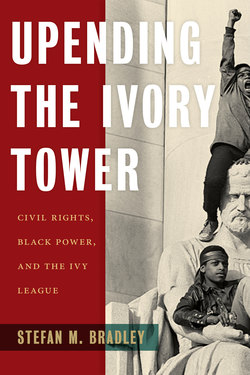Upending the Ivory Tower

Реклама. ООО «ЛитРес», ИНН: 7719571260.
Оглавление
Stefan M. Bradley. Upending the Ivory Tower
Отрывок из книги
UPENDING THE IVORY TOWER
Civil Rights, Black Power, and the Ivy League
.....
Because the members of ABC took it upon themselves to ensure that Princeton became an option for other black students, in 1968, President Goheen and the elite institution saw the fruits of the black student group’s efforts. That school year, Princeton admitted seventy-six new black students while ninety-seven black men altogether attended Princeton, which marked a high for the university.73 Sociologist Jerome Karabel has argued that even more than the Civil Rights Movement of the South, the urban uprisings and Black Power Movement of the North influenced the decision of Ivy League universities to admit black students. The universities, Karabel asserted, were concerned that the rage of the urban poor might be waged on the elite white institutions of higher education if they did not attempt to improve ghetto circumstances by admitting students.74 As a result, black students, some of whom had witnessed violent rebellions in their neighborhoods and were sympathetic to the tenets of Black Power, arrived on Princeton’s campus.
Figure 2.2. One of the first black administrators in the Ivy League, Carl A. Fields (center) of Princeton University, attended the inaugural banquet of the Association of Black Collegians in May 1968. Fields is with the association’s president Paul C. Williams (left) and member Alan D. Buchanan. Courtesy of the Seeley G. Mudd Manuscript Library, Princeton University.
.....